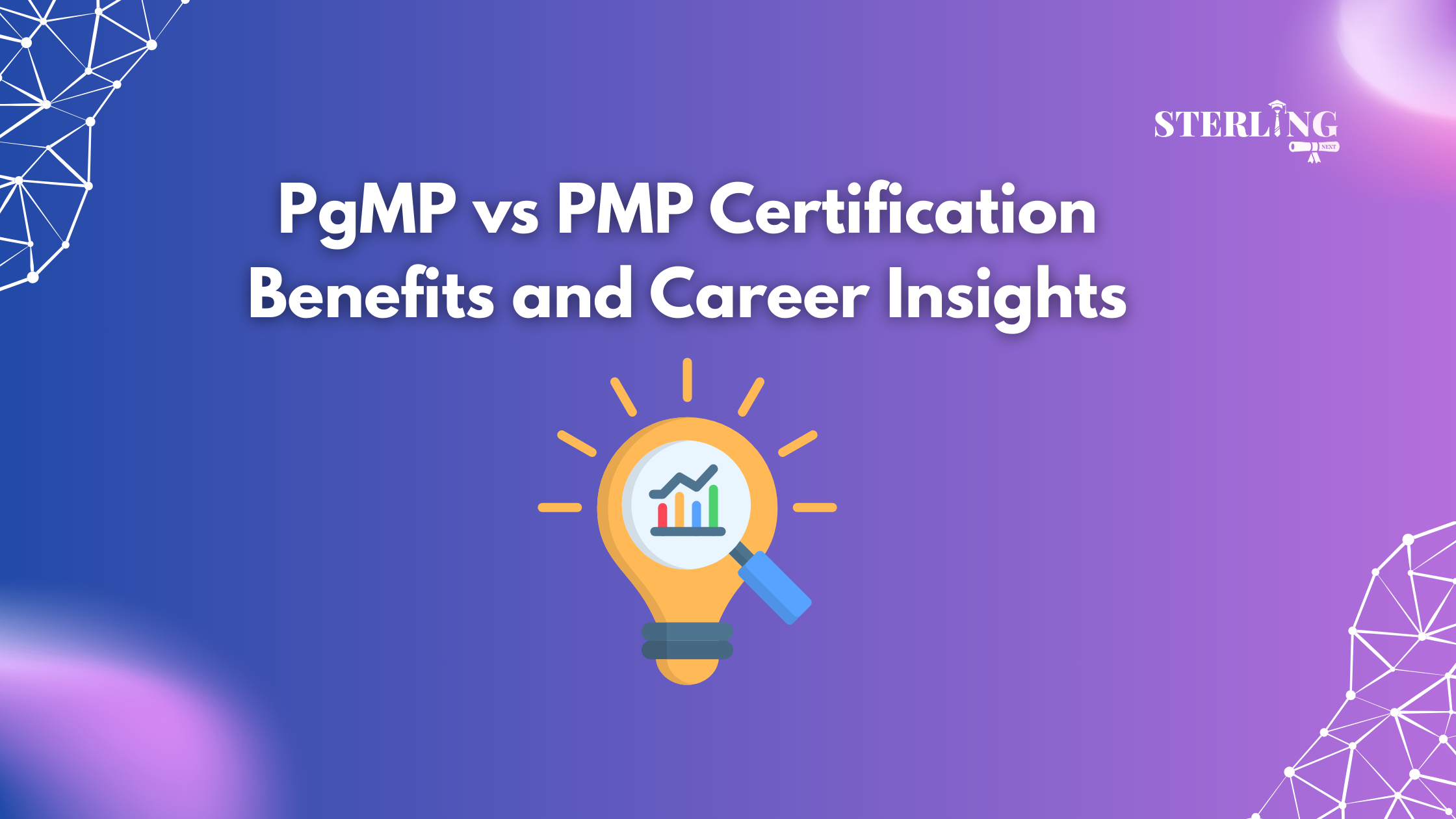PgMP vs PMP Certification Benefits and Career Insights
Training Outcomes Within Your Budget!
We ensure quality, budget-alignment, and timely delivery by our expert instructors.
Table of Content
Recent Blogs
CAPM Exam Prep Complete Guide to Passing the Certification
August 21st, 2025
CompTIA Project+ (PK0-005) A Complete Guide to Career Success
August 21st, 2025
PgMP® Certification Requirements, Eligibility, and Application Process
August 21st, 2025
From Learning to Earning CompTIA Data+ Certification Journey
August 21st, 2025
PMI SP Certification for Smarter Project Timeline Roles
August 21st, 2025
Start Strong with This AWS Solution Architect Exam Guide
August 21st, 2025
Build Stunning HTML and CSS Projects for Your Portfolio
August 21st, 2025
PMP vs PRINCE2 Find the Best Fit for Your Career Goals
August 21st, 2025
Know the Difference Between Projects and Programs
August 21st, 2025
Cyber Security Projects That Build Strong Career Skills
August 21st, 2025

Understanding the pgmp vs pmp debate is important for professionals seeking to grow in project and program management. Both certifications are globally recognized, yet they serve different purposes depending on your career stage and responsibilities. PMP focuses on managing individual projects, while PgMP is tailored for those leading multiple related projects under a program framework.
Get Certified With Industry Level Projects & Fast Track Your Career
Checkout Top 10 Highest Paying Jobs
PgMP vs PMP Career Opportunities and Certification Insights
Understanding the pgmp vs pmp debate is important for professionals seeking to grow in project and program management. Both certifications are globally recognized, yet they serve different purposes depending on your career stage and responsibilities. PMP focuses on managing individual projects, while PgMP is tailored for those leading multiple related projects under a program framework. This guide explores the differences, benefits, career opportunities, and salary insights associated with both certifications.
What is PMP?
Project Management Professional (PMP) certification is one of the most widely recognized credentials for project managers. It validates the knowledge and skills required to successfully manage projects, including scope, schedule, budget, and risk. PMP holders often work on specific projects with clear deliverables, applying methodologies and frameworks to achieve project objectives. This certification is ideal for those seeking roles such as project manager, project lead, or consultant.
What is PgMP?
Program Management Professional (PgMP) certification is designed for individuals managing complex initiatives that consist of multiple interconnected projects. A program manager oversees broader organizational goals, ensuring all projects within the program align with strategic objectives. PgMP holders focus on governance, resource allocation, and benefits realization. This certification demonstrates expertise in handling complexity and delivering outcomes that create organizational value.
PgMP vs PMP: Key Differences
pgmp vs pmp comparison centers around scope and responsibility. PMP certification validates skills in managing projects from initiation to closure. It emphasizes tactical execution. PgMP certification, on the other hand, validates leadership at a strategic level, ensuring programs deliver business value.
- PMP → Focuses on single projects, execution, and tactical delivery.
- PgMP → Focuses on multiple projects, strategy, and alignment with organizational goals.
This makes PMP more suitable for professionals entering or advancing in project management roles, while PgMP is best for senior leaders responsible for program outcomes.
Eligibility Requirements: PgMP vs PMP
Another crucial difference in the pgmp vs pmp pathway is eligibility.
- PMP Eligibility: Requires a secondary degree with 7,500 hours of project management experience or a four-year degree with 4,500 hours, plus 35 hours of project management education.
- PgMP Eligibility: Requires far more experience. Applicants need a secondary degree with at least 10,500 hours of program management experience or a four-year degree with 6,000 hours. This shows PgMP is targeted toward experienced leaders who have already managed multiple projects.
Exam Structure: PMP vs PgMP
The PMP exam consists of 180 questions covering domains like people, process, and business environment. It lasts about 230 minutes and includes multiple-choice, drag-and-drop, and matching formats.
The PgMP exam includes 170 multiple-choice questions, to be completed within 240 minutes. Beyond the exam, candidates must undergo a panel review where certified PgMP holders evaluate the candidate’s program management experience. This added layer makes PgMP more rigorous and demanding.
Career Benefits of PMP Certification
PMP certification enhances credibility and career prospects for project managers. It signals proficiency in project delivery, methodology, and leadership skills. With PMP, professionals gain access to roles such as:
- Project Manager
- Project Lead
- PMO Specialist
- Consultant
Employers value PMP because it ensures professionals can deliver projects on time, within scope, and within budget. PMP also provides global recognition, making it suitable for those seeking international career opportunities.
Career Benefits of PgMP Certification
PgMP certification is highly valuable for senior professionals managing strategic initiatives. It demonstrates advanced expertise in program governance, stakeholder alignment, and benefits delivery. Career opportunities include:
- Program Manager
- Portfolio Manager
- Senior Project Director
- Strategic Advisor
PgMP holders are recognized for their ability to translate organizational strategy into tangible results. Because of the advanced nature of pgmp certification, it is considered one of the most prestigious credentials in program management.
PgMP vs PMP Salary Comparison
Salary expectations often play a big role when deciding between pgmp vs pmp. According to global surveys, PMP-certified professionals earn significantly more than non-certified peers, with average salaries ranging between $110,000 to $125,000 annually.
For PgMP holders, the compensation is even higher. Due to the seniority of roles, professionals can expect salaries upwards of $135,000 to $150,000 annually. The pgmp vs pmp salary difference reflects the strategic value PgMP professionals bring to organizations.
Program Management Certification and Training Path
For those considering PgMP, enrolling in structured program management certification programs is highly recommended. These programs provide knowledge of frameworks, tools, and strategies for managing interdependent projects. Similarly, pgmp certification training can help professionals meet eligibility requirements, prepare for the rigorous exam, and build confidence to pass.
Both certifications require disciplined preparation, but PgMP candidates should expect additional effort due to the panel review process and broader scope of responsibilities tested.
Cost and Investment: PgMP vs PMP
The cost of pursuing PMP and PgMP certifications depends on membership status with PMI and regional pricing.
- PMP Exam Fee: Around $405 for PMI members and $555 for non-members.
- PgMP Exam Fee: Around $800 for members and $1,000 for non-members.
Additional costs may include study materials, training, and practice exams. While the investment for PgMP is higher, the return in terms of senior-level opportunities and increased salary potential often justifies the expense.
Which Certification Path to Choose?
Choosing between pgmp vs pmp depends on your career stage and goals.
- If you are early in your project management career or working primarily on individual projects, PMP is the right choice. It provides essential skills and recognition to advance into mid-level management.
- If you already lead multiple projects, manage complex initiatives, or hold leadership responsibilities, PgMP is the better option. It validates advanced expertise and opens doors to senior leadership roles.
Some professionals choose to pursue both certifications sequentially: first PMP to establish project management credentials, and later PgMP to demonstrate program-level expertise.
Conclusion
The pgmp vs pmp comparison highlights how both certifications serve different but complementary purposes. PMP builds strong foundations in project management and is ideal for career entry or progression. PgMP, on the other hand, demonstrates advanced ability to lead programs and deliver strategic value to organizations. Both certifications enhance credibility, increase earning potential, and provide global recognition. The right choice depends on your career journey, goals, and current responsibilities.
Frequently Asked Questions
PMP focuses on managing single projects, while PgMP validates the ability to manage multiple related projects as part of a program.
Yes. PgMP requires more experience, a panel review, and advanced program management knowledge, making it more challenging than PMP.
Yes, PMP is not a prerequisite. However, many professionals pursue PMP first to build project management expertise before attempting PgMP.
PgMP requires extensive program management experience, including thousands of hours overseeing multiple projects aligned with strategic goals.
Both offer excellent opportunities. PMP suits project-level roles, while PgMP is best for leadership and strategic management positions.
PMP costs around $405–$555 depending on membership, while PgMP costs $800–$1,000. Additional costs may include training and study resources.
Yes. PgMP-certified professionals typically earn higher salaries due to their senior roles, reflecting the pgmp vs pmp salary difference.
Training programs, PMI manuals, practice questions, and study groups are effective for both certifications.
PMP preparation may take 2–4 months, while PgMP often requires 6 months or more due to its complexity.
Choose PMP if you manage projects and want global recognition. Choose PgMP if you lead programs and seek strategic leadership roles.







 Sachin Kumar
Sachin Kumar 
